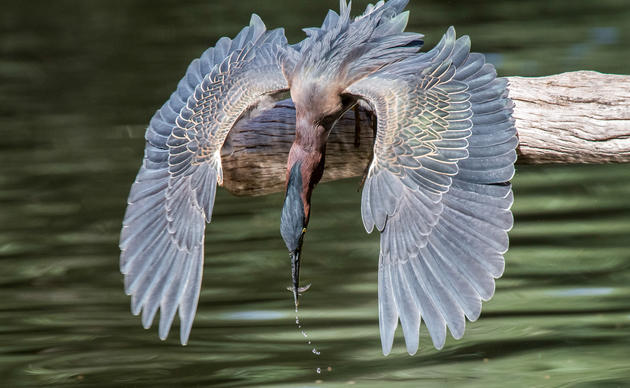CHARLESTON, South Carolina (August 27, 2020) — Today Audubon South Carolina released its newly commissioned report, “An Economic Analysis of the Solar Industry in South Carolina,” which found that the solar energy industry has a $1.5 billion impact in the state, contributes more than $58.8 million in state and local taxes annually, and supports 7,250 South Carolina jobs.
“Expanding access to and use of solar energy not only helps protect the clean air and water that birds rely on, it also helps mitigate emissions associated with a changing climate, which Audubon has identified as the number one threat to birds,” said Justin Stokes, executive director of Audubon South Carolina, “Perhaps just as importantly, South Carolina’s solar industry represents a huge economic opportunity for our state, in the form of jobs, tax revenue, investment and even energy cost savings.”
Conducted by College of Charleston economic professors Frank Hefner, Ph.D., and J. Wesley Burnett, Ph.D., the study uses a regional impact model, IMPLAN, and data from the Solar Foundation’s annual survey of solar jobs to determine the total economic impacts of solar jobs in South Carolina—including related manufacturing, installation, whole trade and distribution, and operations and maintenance.
While South Carolina is currently the fifteenth largest producer of solar energy in the U.S, it has one of the highest growth rates of solar penetration in the nation. The study identified strong net metering policies as an integral component of the industry’s rapid growth in the state, as well as a significant factor in its continued success moving forward.
“Thanks to smart policymaking at the state and federal level, South Carolina’s solar industry has gone from non-existent to one of the fastest growing solar markets in the country in just a few short years,” said Julia Dietz, Policy Director for Audubon South Carolina. “With the continued support of the state legislature and our federal delegation, the opportunity for continued growth is enormous."
Supported by findings from a 2019 U.S. Department of Energy-funded research conducted by Yale School of Forestry and Environmental Studies, the study called South Carolina an “unstoppable giant” on increasing adoption of solar energy, and also identified a number of potential hurdles to the continued growth of South Carolina’s solar industry, including inconsistent policies among investor-owned utilities (IOUs) and electric co-ops, and increased skepticism toward utilities among residents as a result of the failed V.C. Summer nuclear project and related rate increases.
Audubon supports a transition to clean energy sources, like solar, for electricity generation as a means to reduce air and water pollution and greenhouse gas emissions related to traditional energy production. As an added benefit in a state that grapples with increasingly strong and frequent hurricanes and flooding, adding more solar power to the grid and increasing battery storage will help bring the state back online quickly after a natural disaster.
Audubon South Carolina looks forward to working with partners, policymakers and regulators at the local, state and federal level to continue expanding access to solar in the state, including low- and middle-income communities across the state that could benefit significantly from energy-costs savings associated with a transition to solar.
###
What Our Partners and Policymakers Are Saying
"In the midst of the enormous uncertainty and economic hardship caused by the COVID-19 pandemic, South Carolina’s solar industry represents a unique bright spot and significant opportunity when it comes to building a cleaner, more robust, and more equitable economy."
—U.S. Rep. Joe Cunningham (SC-1)
“The solar industry in South Carolina supports thousands of jobs and has a $1.5B impact on our economy. These findings show that if we continue to support the solar industry in our state, we will continue to see economic and environmental returns for years to come. Thank you to Audubon South Carolina for conducting this study to assess our continued solar growth to help make South Carolina a leader in this industry.”
— U.S. Rep. William Timmons (SC-04)
“South Carolina’s burgeoning solar industry promises to be a central pillar in our state’s future economy. The disproportionate hardship caused by COVID-19 to the industry must not be allowed to break that promise. That is why we must ensure that public and private incentives remain to encourage individuals and businesses to invest in solar for cheap, clean, and job-creating energy production. As the co-chair of the bi-partisan Congressional Solar Caucus, I will be doing my part in Congress to protect the future of energy consumers and companies back home and across the country.”
— U.S. Rep. Ralph Norman (SC-05)
"South Carolina is known for its scenic landscapes and natural beauty, which we can help preserve by fostering the continued growth of renewable energy sectors. The solar industry has become an important driver of economic investment and job creation in our state while giving South Carolinians more energy options. We must do all that we can to continue this growth."
— Gov. Henry McMaster
“Dr. Hefner’s and Dr. Burnett’s economic analysis of the solar industry in South Carolina is both timely and informative. The Energy Freedom Act enacted in 2019 opened up South Carolina’s grid to rooftop solar by eliminating the net metering cap, but that was just a first step; there’s more we can and must do to ensure that renewable energy has the chance to compete on a level playing field with the mega-utilities and their monopolies. I applaud Audubon SC for commissioning this analysis and I look forward to taking the next step.”
—Sen. Tom Davis (R-Beaufort)
“I supported the Energy Freedom Act to benefit consumers and businesses and unleash the job-creation potential that comes with leading on renewable energy. Clean energy sources like solar also have ecological benefits that protect the Lowcountry’s natural resources and quality of life. We have more work to do to expand access to solar energy in South Carolina, and this analysis highlights the economic opportunities we can realize by continuing to reduce regulatory barriers to solar energy adoption.”
—Sen. Chip Campsen (R-Beaufort, Charleston & Colleton Counties))
“I thank Audubon South Carolina for documenting the importance of the solar industry to capital investment and job creation in our state. Amid all the uncertainty of the pandemic, it’s more important than ever to maintain and leverage the enormous potential of South Carolina’s solar industry. This includes cutting red tape and reducing overly onerous regulatory barriers, which add to both the time and cost of installation.”
—Rep. Nathan Ballentine (R-Lexington & Richland Counties)
“This is the first study to measure how much solar energy means to our economy after major growth during the past four years. The solar industry is bringing jobs and opportunity to South Carolina, in addition to cleaning up the air we breathe and the water we drink.”
— Eddy Moore, Energy and Climate Program Director, Coastal Conservation League
“This report clearly shows the economic and environmental benefits of solar energy are clear - solar is good for jobs, good for the economy, and good for the environment. But we can't stop there; we must ensure that equitable access to solar is available to all who want it in South Carolina — regardless of income, race, or geographic region. We look forward to working with Audubon South Carolina, affected communities, and other partners to remove barriers to solar adoption — particularly in low income communities who could benefit the most from lower energy rates.”
— John Tynan, Executive Director, Conservation Voters of South Carolina
Whether your interest is birds or business, or anything in between, this new report highlights how solar benefits South Carolina. The report also includes recommendations for how to sustain the vibrant clean energy market in this state.”
— Bryan Jacob, Solar Program Director, Southern Alliance for Clean Energy (SACE)
About the Authors
Frank Hefner, Ph. D., is a Professor of Economics and director of the Office of Economic Analysis at the College of Charleston. He received his B.A. Degree in Economics from Rutgers College and his M.A. and Ph.D. Degrees from the University of Kansas. He taught at Washburn University in Topeka while he was a research assistant in the Institute for Policy and Social Research at the University of Kansas and at the University of South Carolina where he served as aresearch economist in the Division of Research. Dr. Hefner's research interests include regional economic development and forecasting. He participates in the Regional Advisory Committee of the S.C. Board of Economic Advisors. He is a past president of the Southern Regional Science Association.
J. Wesley Burnett, Ph.D., is an applied economist with research interests in energy and natural resource markets and policy. Dr. Burnett studied natural resource and environmental economics at the University of Georgia, where he received his Ph.D. in 2011. He has secured eight hundred thousand dollars in external, competitively funded grants and cooperative agreements and has been published in more than two dozen academic journals. In addition to research, Dr. Burnett teaches undergraduate microeconomic theory and graduate-level microeconomic theory applied to environmental policy. He is actively involved with numerous economic associations including the Association for Environmental and Resource Economists, the American Economic Association, and the International Association for Energy Economics.
About Audubon South Carolina
Audubon South Carolina protects birds and the places they need, right here in South Carolina. We’re the state office of the National Audubon Society, which has more than one million members and a century-long track record of success. In South Carolina, we represent more than 26,000 Audubon members and supporters, eight Audubon chapters and bird club partners, two Audubon centers and 22,000 acres of land that we own and manage. Learn more about what we do and how to help at sc.audubon.org. Follow us on Facebook at @ScAudubon, Twitter at @AudubonSc, and Instagram at @audubon_sc.
About Audubon
The National Audubon Society protects birds and the places they need, today and tomorrow. Audubon works throughout the Americas using science, advocacy, education, and on-the-ground conservation. State programs, nature centers, chapters, and partners give Audubon an unparalleled wingspan that reaches millions of people each year to inform, inspire, and unite diverse communities in conservation action. A nonprofit conservation organization since 1905, Audubon believes in a world in which people and wildlife thrive. Learn more at www.audubon.org and on Facebook, Twitter and Instagram @audubonsociety.
Media Contact
Angelina Ricci Eisenhauer



